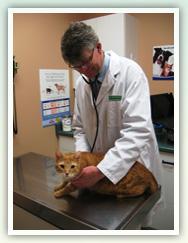
Human Medications Can be Bad for Pets as Reported by Your Veterinarian from Coventry Animal Hospital
There are many human medications that can be very dangerous for your pet, even in small doses. While these drugs are safe for humans, dogs and cats often metabolize them differently, resulting in very different effects. Coventry Animal Hospital will describe some of the most common medications that we see given to pets that can have serious consequences:
Tylenol (Acetaminophen): While Tylenol is considered a safe drug for humans to take, it can be fatal for your pets, especially cats. One pill is enough to be fatal as cats do not possess the liver enzymes necessary to metabolize it properly. It will damage a cat’s red blood cells, limiting its body’s ability to carry oxygen to important tissues. Tylenol can cause severe stomach upset, ulcers and liver failure in dogs.
Other NSAIDS (Aspirin, Ibuprofen, etc): Any NSAID medication not prescribed by your veterinarian has the potential to seriously harm your pet. It can cause serious stomach upset – including severe ulcers. IT can also cause damage to your pet’s kidneys, eventually resulting in kidney failure.
Pseudoephedrine (cough medications, allergy medications, etc.): Any medication listed as “non-drowsy” may include this ingredient. This medication can be dangerous, even at low doses (just one tablet can be lethal in a small dog or cat!). Ingestion can result in vomiting, seizures, and death.
Sleep Aids (Xanax, etc.): While these medications are occasionally used in pets (depending on the amount), medications used for sleep aids in humans can actually have the opposite effect in dogs such as agitation, aggression, and hyper-excitability. This is often followed by severe lethargy. Sleep aids can result in lethal liver failure in cats.
Anti-depressants (Cymbalta, Prozac, etc): Similar to sleep aids, these medications are sometimes used in pets; but depending on the dose, can result in aggression, agitation, decreased appetite, and seizures. A cat having just one pill can result in a highly toxic dose.
Estrogen/Steroid Creams: Pets can easily be exposed to these creams by licking owners after the owner has applied them. While single time exposure may not be significant, regular exposure can cause bone marrow suppression and even result in an endocrine disease called Cushing’s disease. This disease causes weight gain, hair loss, and increases in drinking and urination.
All human medications have the potential to do serious harm to your pet and some can have lethal consequences. Never give your pet a human medication without first contacting your veterinarian. If your pet swallowed medications it shouldn’t have, get it to a veterinary clinic right away. The sooner you get it there, the more likely your vet with be able to induce vomiting and limit the dangerous effects medications can have. Make sure to let your veterinarian know exactly what medication your pet ingested, as it is critical information for your veterinarian to have to make an appropriate treatment plan to save your pet’s life.
















